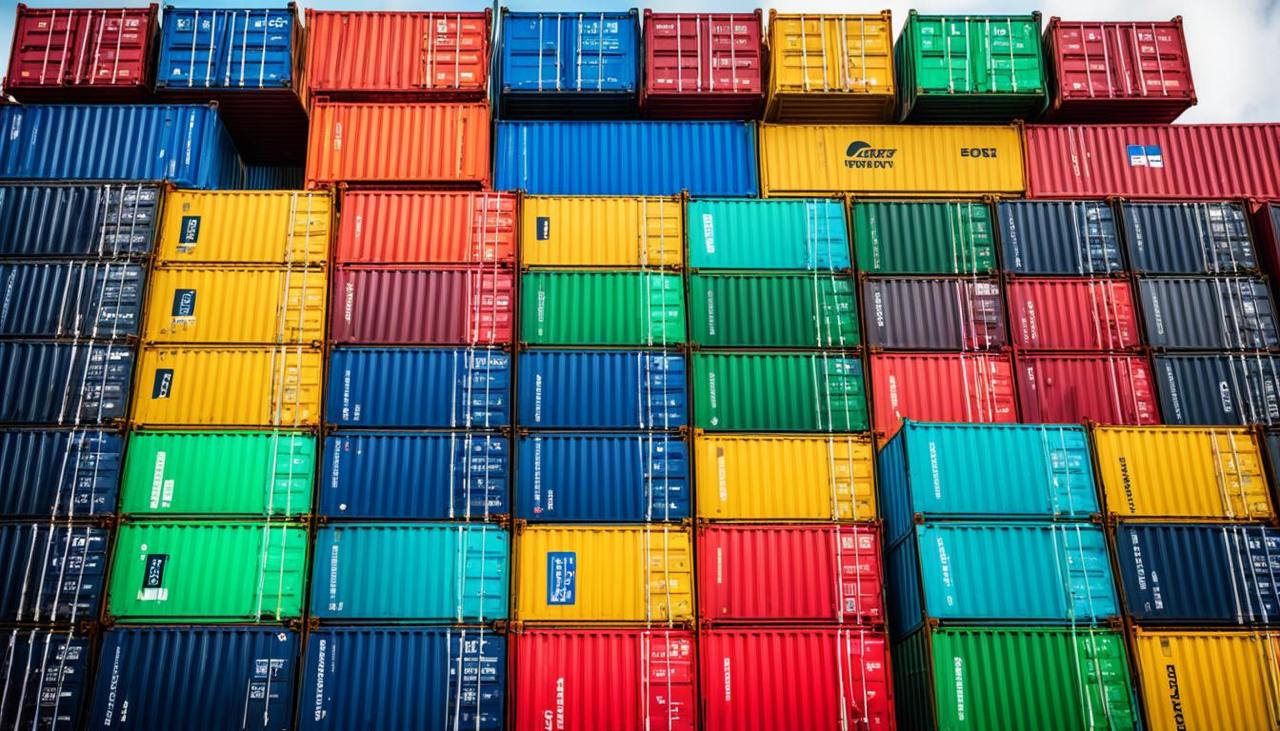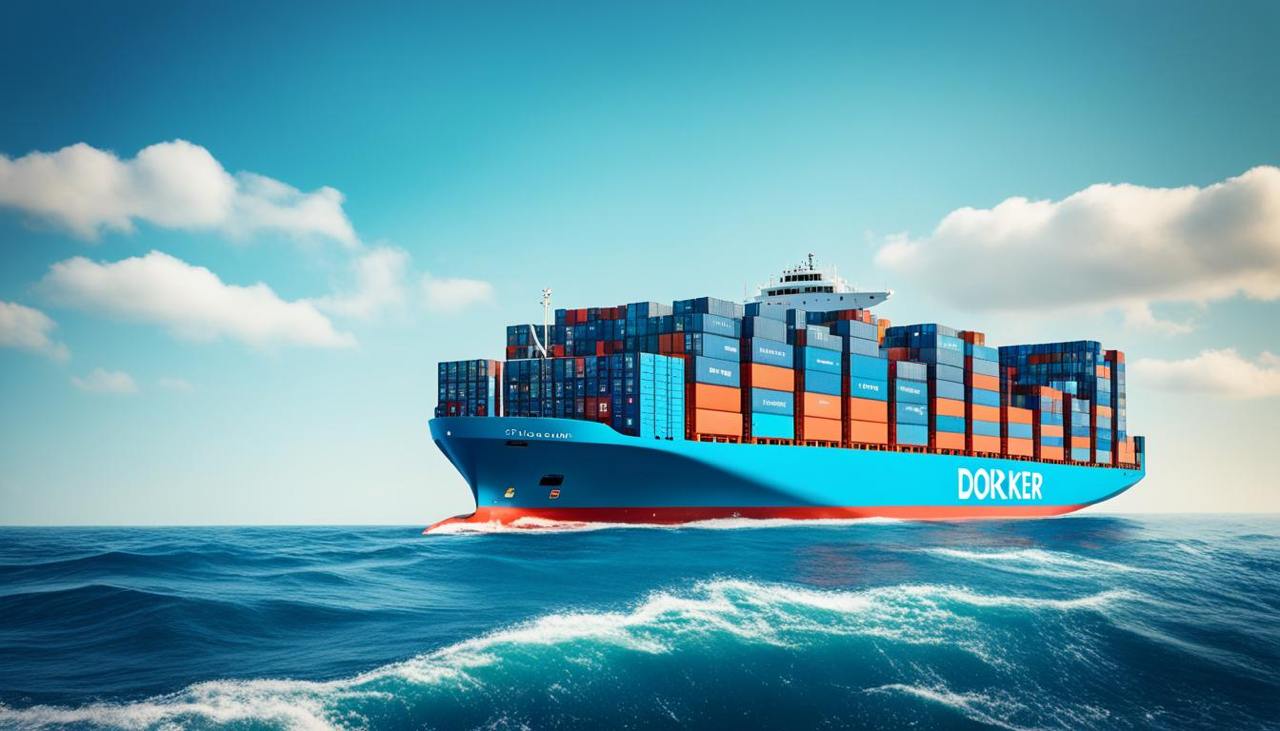In today's fast-paced digital world, Docker is a big deal. It changes how we make and deploy apps. This guide will show you Docker's power. It's a platform that changes how you work with your apps.
Docker makes making, deploying, and managing apps easier. It lets you work more efficiently. With Docker, you put your app and its needs into containers. This means you don't have to spend a lot of time setting things up. You can focus on making and deploying your apps.
Key Takeaways
- Discover how Docker can streamline your app development and deployment processes.
- Understand the role of containerization in modern application development.
- Explore the benefits of Docker for agile teams, including improved collaboration and productivity.
- Learn how Docker can help you achieve seamless deployment and consistent environments across platforms.
- Discover how Docker can enhance your cloud hosting and infrastructure-as-a-service strategies.
Embracing the Docker Revolution
Docker has changed the game in software development. It's now key to how apps are made, put out there, and kept running well. This platform makes apps work the same everywhere, solving problems of moving apps around and keeping them consistent and big enough.
Understanding Docker's Role in Modern Development
Docker changes the game by giving apps a standard, reliable space to work in. It puts apps and their needs into containers that work the same on any computer, from your own to big cloud servers. This makes sure apps work well everywhere, including cloud hosting places.
Benefits of Docker for Agile Teams
Docker is a big win for agile teams. It makes making and putting out apps quicker, helps teams work better together, and fits well with many tools. This means teams can make and send out top-notch software faster.
- Faster deployment: Docker makes putting apps out there quicker and easier, cutting down the time and work to get an app from making to using.
- Improved collaboration: Docker makes sure everyone works in the same reliable environment, making teamwork smoother, no matter what their computers are like.
- Seamless integration: Docker works well with many development tools and systems, letting teams use what they're already used to.
Docker is a big deal in the world of making software. It's changing how apps are made and put out there, helping teams get ready for the future of app development.

Demystifying Docker Containers
Docker has changed how we make and send out apps with containerization. At its heart, Docker uses containers. These are light and easy to move around. They pack an app with everything it needs, making sure it works the same everywhere.
Containerization is key to Docker's success. It keeps an app and its needs in a container. This means the app works the same, no matter where it is. It makes moving apps from a developer's machine to a server easy.
Docker containers are great because they don't use a lot of resources. They don't need a whole operating system like virtual machines do. This makes them start up fast and use resources well.
- Portability — Applications packaged in Docker containers can run consistently across different environments, from development to production.
- Resource Efficiency — Docker containers are lightweight and share the host system's resources, resulting in faster startup times and better resource utilization.
- Scalability — Docker's scalability allows you to easily spin up or down multiple instances of your application, adapting to changing demand.
Understanding Docker containers helps us see how it helps developers work better. It makes building, testing, and sending out apps faster. This leads to more innovation and speeds up making software.

Accelerating App Development with Docker
Docker has changed how developers work on apps. It makes building, testing, and shipping apps faster. Docker makes sure teams work together better and get more done.
Streamlining Development Workflows
Docker uses container technology to make moving apps from development to production easier. Developers can focus on coding, not setting up complex environments. Docker puts an app and its needs into one container. This means the app works the same everywhere, from a local machine to a server.
Enhancing Collaboration and Productivity
Docker helps teams work better by making sure everyone has the same environment. Developers can share their work without worrying about differences in setup. This leads to better teamwork and faster work for agile teams.
- Containerization — Ensures consistent and predictable development environments
- Streamlined Workflows — Accelerates the development-to-deployment pipeline
- Enhanced Collaboration — Enables teams to work together more effectively
- Increased Productivity — Empowers developers to focus on writing code, not configuring environments
Using Docker, teams can improve their workflows. This leads to a more efficient and collaborative environment. It helps in delivering new docker and cloud hosting apps faster.
Seamless Deployment with Docker
Using Docker, you can make deploying your apps easier and ensure they work the same everywhere. Docker uses containers to fix the "works on my machine" issue. This makes it a trusted way to package and share your apps.
Consistent Environments Across Platforms
Docker helps you keep development, testing, and production environments the same, no matter where they are. This means your apps will act the same whether they're on your own servers or in the cloud. Docker makes sure your apps run smoothly, lowering the chance of problems and making deployment easier.
| Environment | On-Premises | Cloud IaaS |
|---|---|---|
| Development | ✓ | ✓ |
| Testing | ✓ | ✓ |
| Production | ✓ | ✓ |
Keeping environments the same across platforms makes deploying apps smoother. It cuts down on compatibility issues and gives users a better experience.
"Docker's ability to create consistent environments across different platforms is a game-changer for modern application deployment."
Docker and Cloud Hosting
The popularity of docker is growing fast. Developers are now looking at how it works with cloud hosting. This combo brings more flexibility and saves money for Docker apps.
Harnessing the Power of IaaS
Running Docker on cloud platforms lets you easily change your setup as needed. Services like Amazon Web Services (AWS) or Google Cloud Platform (GCP) offer many virtual resources. You can quickly add or remove instances and manage resources with Docker.
Cloud hosting also has cool features like load balancing and auto-scaling. These help make your Docker apps more reliable and fast. Using Docker with the cloud makes a strong, cost-saving setup for your apps.
- Scalability — Rapidly scale your infrastructure up or down to meet changing demands.
- Managed Services — Leverage cloud-based solutions for database, storage, and other core infrastructure components.
- Cost Optimization — Pay only for the resources you use, with the ability to scale down during off-peak periods.
Using docker and cloud hosting opens up new ways to make your apps better. Check out the many IaaS options and see how you can use these technologies fully.
Scaling Applications with Docker
In today's fast-paced software world, scaling applications efficiently is key. Docker has changed the game with its containerization. It lets you scale your apps to fit changing user needs and resource demands easily.
Docker's design makes scaling easy. Containers are light and move easily between environments. This lets you scale your apps both horizontally and vertically. Your software can adjust to more users and tasks smoothly.
Horizontal Scaling with Docker
Horizontal scaling means adding more containers to your app to spread out the workload. It's great for handling more users or heavy tasks. Tools like Kubernetes and Docker Swarm make it simple to manage and scale containers. They adjust the number of instances based on rules and metrics.
Vertical Scaling with Docker
Vertical scaling gives containers more resources like CPU, memory, or storage. Docker makes it easy to increase or decrease resources in each container. This way, your app can handle more demand or adjust to new resource needs without big infrastructure changes.
Whether your Docker apps are on-premises or in the cloud hosting, Docker's scalability helps you meet your business and user needs.
"The ability to scale applications quickly and efficiently is a game-changer in the modern software landscape. Docker's containerization technology empowers developers to respond to changing demands with unprecedented agility."
Ensuring Application Security with Docker
In the world of Docker, keeping your apps safe is key. Docker's security features help protect your apps from risks. By using best practices, you can make your apps more secure.
Implementing Best Practices
Here are some tips for keeping your Docker apps secure:
- Image Hygiene: Make sure the Docker images you use are from trusted sources. Check them for any vulnerabilities or bad content.
- Least Privilege Principle: Give containers only what they need to do their jobs. This limits the risk of unauthorized access.
- Secure Container Networking: Use secure networks to keep data safe. Docker's overlay networks are a good option.
- Vulnerability Scanning: Check your Docker images and containers for vulnerabilities often. Fix any problems you find quickly.
- Secure Image Storage: Use secure registries to store your Docker images. This keeps them safe and controlled.
- Continuous Monitoring and Logging: Set up good monitoring and logging to catch and handle security issues fast.
By following these security tips, your Docker apps will stay safe and strong against threats. Using Docker's security features and being proactive will protect your IaaS deployments. It will keep your system secure overall.
Docker: A Game-Changer for DevOps
Docker has changed the game in modern software development. It makes DevOps easier by using containerization. This means teams can work better together and automate tasks more easily.
DevOps teams want to work faster and deliver software reliably. Docker helps them by making sure everyone works in the same environment. This solves the old problem of "it works on my machine" by making things more standard and easy to use.
Docker makes it easy to deploy apps quickly and work together. Developers can put their apps and all needed parts into containers. This makes deploying apps simpler and ensures they work the same everywhere, whether on cloud hosting or locally.
Also, Docker works well with DevOps tools like CI and CD pipelines. This helps teams work better together and automate tasks. Developers can focus on coding, while others handle deploying and scaling, making things faster and more reliable.
As software development changes, Docker is becoming key for DevOps teams. It brings efficiency, better teamwork, and faster app delivery with great consistency.
Building a Docker-Powered Development Pipeline
Using Docker can change how you develop and deploy applications. It makes your development process smoother, more consistent, and efficient. By adding Docker to your workflow, you can make sure your software projects are delivered well.
Integrating Docker into Your Workflow
Here are steps to create a Docker-powered development pipeline:
- Set up a Docker-based development environment: Create a Docker setup that matches your production setup. This ensures your app works the same at all stages of development.
- Implement Docker-based build automation: Use Docker to automate building. This means every change or update builds a version that's easy to test and deploy.
- Leverage Docker for continuous integration and deployment: Add Docker to your CI/CD pipeline. This lets you deploy apps to different cloud hosting platforms easily.
- Monitor and manage your Docker-based applications: Use Docker's tools to keep an eye on your apps. This helps ensure they run well and reliably.
With a Docker-powered pipeline, you can make your workflows smoother, improve team collaboration, and deliver software reliably and securely.
- Consistency — Docker makes sure your apps work the same everywhere, at all stages of development.
- Scalability — Docker lets you scale your apps easily, both up and down, as needed.
- Efficiency — Automating with Docker speeds up and makes your development process more reliable.
Use the power of Docker to speed up your app delivery. It improves teamwork and makes deploying your infrastructure-as-a-service (IaaS) solutions smooth.
"Docker has become an essential tool in our development process, enabling us to build, test, and deploy our applications with unparalleled speed and consistency."
Conclusion
Docker has changed the game in app development and deployment. It makes workflows smoother, improves teamwork, and makes sure environments are the same everywhere. This guide has shown you how Docker can change your software development for the better.
Use Docker to boost your app development and deployment. It works great with cloud hosting and infrastructure-as-a-service (IaaS) solutions. Docker makes managing and deploying apps easier and more reliable.
Join the Docker revolution to make the most of your development and deployment work. With Docker, you can handle the fast-changing world of software development easily. It helps you deliver apps reliably, securely, and on a large scale.
FAQ
What is Docker and how does it streamline app development and deployment?
Docker is a tool that makes it easier to work with applications. It lets you put your apps and their needed parts together in one package. This makes sure your apps work the same way everywhere, making your work flow better and easier to share with others.
What are the key benefits of using Docker for agile development teams?
For agile teams, Docker means faster and smoother work. It helps everyone work together better and fits well with the tools you already use. Docker makes it easier to move your apps around without trouble, making your work more reliable and efficient.
How does Docker's containerization approach work, and what are its advantages?
Docker uses containers to keep your apps and their parts together. This means your apps work the same way everywhere, without needing extra setup. Containers are great for keeping things separate, growing your apps easily, and making them easy to move around.
How can Docker streamline my application development workflows?
Docker makes it easier to move your apps from making them to putting them out there. It helps your team work together better by making sure everyone has the same setup. This makes your team work faster and more efficiently.
How does Docker ensure consistent environments across platforms, including on-premises and cloud-based infrastructure?
Docker makes sure your apps work the same way everywhere, solving the "works on my machine" problem. This works on both your own servers and in the cloud, making it easy to put your apps out there.
How can I leverage Docker with cloud hosting platforms and infrastructure-as-a-service (IaaS) providers?
Docker works well with cloud services, letting you use the cloud's power for your apps. By using Docker on cloud services, you get the best of Docker and the cloud together, making your apps run smoothly.
How can Docker help me scale my applications to accommodate fluctuating user demands and resource requirements?
Docker lets you grow your apps in size and power as needed. With Docker's tools, you can easily make your apps ready for more users and more resources, keeping them running smoothly.
How can I ensure the security of my Docker-based applications?
Docker has security tools and advice to keep your apps safe. By using these, you can protect your Docker apps and keep them secure.
How does Docker become a game-changer for DevOps practices?
Docker fits well with DevOps, making it easier to work together and automate your app's life cycle. Docker helps DevOps teams work better, deliver faster, and make their apps more reliable.
How can I integrate Docker into my existing development workflow and build a Docker-powered pipeline?
To make a Docker-powered pipeline, add Docker to your current work flow. Use the tools and methods out there to create a Docker-based pipeline that makes delivering your apps better, bigger, and more efficient.







